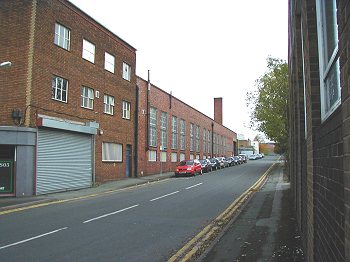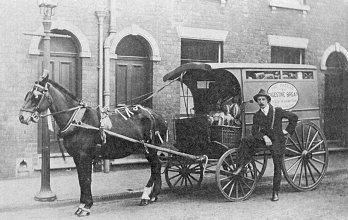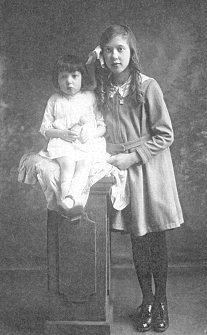Memories of my Home
| Thirty nine St Marks Street, adjoining Chapel Ash,
was a small terraced house. It had no front garden, the front door
opened directly from the footpath into the front room. Over the
fireplace (where an open fire was lit at Christmas and on other
special occasions) was an oak overmantel with a large mirror. At
each end of the marble shelf was a black metal model horse. I cannot
remember if the horses had riders, but I think one horse was rearing
on its hind legs with fore legs poised. |
|

St. Marks Street today. |
There was also a display of small china pieces, some with crests or
pictures of their places of origin, seaside resorts, London etc.
The chairs in the front room had high backs and green, ribbed velvet
seats. There was also a couch or sofa in similar style. Loose covers
were in place to prevent the sun fading the fabric. They were not to
prevent sticky fingers, as we children were only allowed in the front
room if there were visitors and then we would be suitably scrubbed and
dressed!
|
|
We had a piano at home, which was my Mom's pride and joy. There was an
assortment of light music and hymnbooks with tunes. With the advent of
children Mom had little time to play, but she did ensure that some of us
children had lessons from a lady who charged one shilling an hour. I had
my lessons once a week after school. I proudly took my music to school
in an old music case, to prove that our family had a piano and that I
was a budding pianist!
On a side cupboard stood the gramophone. This was Dad's pride and joy
and he was the only one to operate it. It was a solid oak cabinet with a
turntable and a handle on the side to wind it up and set it in motion.
The music came out through a long trumpet horn. Most of our records had
a picture on their label of a little dog sitting alert, listening to
'His Master's Voice', which was the name of the record company.
|
| After sitting quietly while Dad played his romantic
ballads of the 1900s, some of us older children were anxious for a
bit of activity and persuaded Dad to put on one record that would
always cause some action. 'Go on Dad, put 'Abee' on.
''Abee, Abee, Abee, my boy..' sang out the horn. 'What..
'(click,jump) 'What.. '(click,jump) 'What.. '(click,jump) - and
nothing further. The machine flatly refused to complete the
question. |

Dad at work. |
The musical interlude always ended with Gilbert
and me donning our coats and carrying the heavy cabinet, minus its
horn, round to an old man two streets away. He used to sit on a
stool in his open doorway waiting for 'Abee' to wreck our machine so
that he could repair it. Having had the gramophone mended, we
children couldn't wait for the next time we could persuade Dad to
'Try 'Abee' again this time.' Yes - here it comes... 'Abee, Abee,
Abee my boy. What...' (click,jump). The complete question - 'What
are you waiting for now?' never came and it was time for another
trip to the old man two streets away.
The door from the front room opened into our living room, a big room
which served as a dining room as well. A large black range with a
fireguard round it provided us with warmth and an oven for cooking. The
chimney had to be swept at least twice a year. Although the visiting
chimney sweep bedecked the range with a protective sheet, he usually
succeeded in letting soot get everywhere, and there was plenty of
cleaning to do after he left. It was great fun for us children to rush
outside to see if and when the round, bristly brush would appear through
the top of the chimney.
A large, unpolished table, which had to be scrubbed, stood near to the
window, with eight chairs around it. Usually, each of us sat in the same
place, but sometimes the one nearest Dad did an 'exchange' because Dad
was strict - and at the first sign of any misbehaviour he would land a
slap on the nearest culprit.
To giggle during a meal meant instant banishment to the back kitchen or
scullery to eat alone by the big stone sink. The sink had a cold water
pump - which had to be encouraged to give water by priming it i.e. it
had to be given a jug of water in the top before it would perform as it
should.
Next to the sink was a small table, under which resided the big wooden
wash-tub, and opposite that, a huge iron framed mangle. In another
corner stood the black gas-stove. This had to be black leaded to make it
shine, as did the range in the living room. In another corner was a
'copper', which was filled with water and heated from a fire underneath.
Apart from boiling a kettle, this was the only means to get hot water.
|
|

My dad's sisters, Maggie, Ciss and Edie. |
A zinc bath hung on one wall and baths were taken in
order on Friday and Saturday nights. The boys followed each other in
the same water, cleanest first! Margaret and I bathed on a separate
night. I think Mom and Dad went to the Public Baths, next to the
swimming pool in Bath Avenue, near to the West Park. A small veranda
opened on to the back yard where Dad had fixed a beam for a swing.
He had a box of soil at one end of the yard where he grew a Virginia
Creeper. Tiny shelves in another corner of the yard were decked with
pots of trailing Buttercup Creeper. |
|
At one time we had a bantam cock and two or three hens in a pen. We had
to take it in turns to feed and water them. This could be tricky, as the
brightly coloured banty cock was quite aggresive and flew wildly at the
open door to the pen. A shovel was frequently used to protect the feeder
from injury and prevent the cock from escaping. On occasions when he did
escape, he caused panic by flying to perch on a high wall and where he
crowed incessantly to the annoyance of neighbours. I suppose he came
down when he got hungry, and one of us would open the pen and shut him
in.
Bantam eggs are quite small compared to hen's eggs and we kept a strict
rota as to who's turn it was to eat one.
A small brick yard at the far end of the yard housed our toilet. In my
early years, the actual toilet was a galvanised bin under a strong
wooden board with a hole cut in it. Our toilet paper was newspaper cut
to size by one of us, threaded onto string, and hung on a nail. Mom
always called them 'hymnbooks. . Once a week the 'night soil' men came
along with grappling hooks and dragged the aforesaid container down the
yard, through the veranda and down the entry to a huge wagon in the
street. Then they returned the emptied bin and we had a clean start!
With eight people in the house there was often a queue for the lavatory
and if I stole a few extra minutes to read my book, one of the boys
would yell, 'Mollie is in the lav and she's reading a book and won't
come out!' Thus my literary education was somewhat thwarted.
What a splendid advance it was when a proper flush toilet was
installed. I remember the great day and we all made extra visits to
experience the thrill of the new type of toilet seat and the instant
flush of water when we pulled the hanging chain.
Our home in St Mark Street was quite near to the West Park and I was
often detailed to take the boys there to play football or cricket. When
we played at home in our yard, the game usually ended with the breaking
of a window and Dad's stern voice saying, 'Put 'em up. Put things away
and come in and read your books.'
|
| Dad's eldest sister, Auntie Louie, lived in
Saskatoon in Canada and she would send us gifts for Christmas and
birthdays. Once she sent one of the boys a little sail boat. We
attached it to a ball of string and I headed the procession of
brothers to try it out on the vast lake. The boys took it in turns
to hold the string and let the little boat float out. Each brother
let it out a bit further and then disaster overtook, and one of them
let go of the string. |

Mollie, Harry and Gilbert, in 1915. |
|
Our efforts to reach the string without falling into the water were
unsuccessful, but I was afraid to return home with wailing brothers and
no boat, so I had to think of a solution. The park-keeper could probably
help, so we trooped off to his residence which was just inside the main
gate. We all stood in a line and I knocked on his door. When he
appeared, I asked if he could please lend us a clothes prop so that we
could retrieve our precious boat. He told us sternly not to be so stupid
and to go home without causing him further nuisance. We left the park
and the boat, and sadly and slowly walked home with far less enthusiasm
than when we had ventured forth. No doubt Mom was pleased to see us all
return safely and the incident was soon forgotten. But I still clearly
remember that day.
Our house was quite near to some shops and I was sometimes trusted to
go to the butchers, for example, and take the pram with the two youngest
safely fastened in. It was quite a tall pram with large wheels and I
could only just manage to see over the heads of the occupants and guide
the carriage along the footpath. One day, when crossing the road from
one footpath to the other, I put the front wheels down the kerb and they
got stuck in a grating. Pram, contents and driver went over into the
road. Fortunately there were no vehicles about and none of us was hurt.
But I was shaking at the thought of going home and explaining what had
happened.
|
|

Margaret and Mollie in 1923. |
My brother, Jim, was the naturalist of the family and had various pets.
He kept a toad in the cellar, which gave me the excuse not to go down
there. He also had a rabbit and I remember him encouraging the rabbit
and the cat to be friends by letting them be free together in the yard.
The cat caused Jim great distress when it tried to get to his canary
which was in a cage, which hung from the ceiling. One day the cat must
have leapt at the cage and the canary died of fright.
It was Jim who brought a strange worm home one day. Dad identified it
as a leech and had it put down the toilet. Poor Margaret was so
frightened it would suck her blood that she went next door to use the
neighbour's lavatory.
|
|
During the school holidays we needed more excitement than just playing
in our yard, or the West Park, so we were allowed to go off on hikes.
Mom equipped us with sandwiches, a bottle of water, a billycan, a packet
of cocoa powder, some condensed milk, a box of matches and a couple of
enamel mugs. Off we marched. The weather always seemed so good during
school holidays, so no need for coats and macs. Kingswood Common was a
favourite destination, a walk of about ? miles. When we got there, we
removed a piece of turf, collected twigs and sticks, lit our fire and
heated the water in the billycan. The cocoa was made and we settled down
to a lovely picnic. Before returning home, the fire was extinguished,
the turf replaced and the site left clean and tidy.
On one occasion we changed our plans without telling our parents. When
we reached Tettenhall we decided to continue our walk alongside the
canal. It was a very hot day and when we returned home, tired and
dishevelled, we were met by Dad who questioned us about where we had
been and why had we not kept to the route we had planned. Guess how we
felt when Dad told us that he had returned home early and gone in his
van to meet us and give us a lift home!
Another time we went to the Seven Cornfields and Baggeridge Woods for
our walk. We picked bluebells, a large bunch each to take home for Mom.
She hadn't enough vases for them all and lots ended up in a bucket of
water outside. At one point on that walk we found a tiny baby rabbit
which was too frightened to run away. Jim, the naturalist, picked it up,
tucked it in his jacket and carried it home carefully. Unfortunately the
little rabbit died before he had time to care for it.
|
|